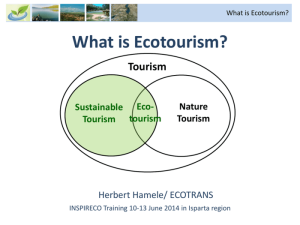
Embark on a journey to discover the Best Ecotourism Destinations 2024, showcasing the most captivating spots for sustainable travel enthusiasts. From lush rainforests to pristine beaches, these destinations offer a unique blend of adventure and conservation efforts.
Explore the top ecotourism spots that are paving the way for responsible travel and environmental preservation.
ECOTOURISM

Ecotourism is a form of sustainable travel that focuses on responsible exploration of natural environments, conservation of wildlife, and support for local communities. It aims to minimize the negative impact on the environment and promote awareness and appreciation of nature.
Unlike traditional tourism, which often prioritizes mass tourism and commercial activities, ecotourism emphasizes the importance of preserving the environment and promoting cultural understanding. It involves activities that are environmentally friendly, socially and culturally respectful, and economically beneficial to local communities.
Examples of Ecotourism Activities:
- Hiking through protected natural areas
- Wildlife safaris with minimal disturbance to animals
- Volunteering for conservation projects
- Visiting indigenous communities to learn about their culture and traditions
- Staying in eco-friendly accommodations
Best Ecotourism Destinations 2024
Ecotourism has gained significant popularity in recent years as travelers seek sustainable and environmentally friendly travel options. Here are some of the top ecotourism destinations for 2024 that offer unique experiences while promoting conservation efforts:
1. Costa Rica
Costa Rica is renowned for its rich biodiversity, with lush rainforests, stunning beaches, and diverse wildlife. The country has made significant efforts to protect its natural resources through national parks, wildlife reserves, and sustainable tourism practices.
2. Galapagos Islands, Ecuador
The Galapagos Islands are a UNESCO World Heritage Site known for their unique and endemic species, such as the giant tortoises and marine iguanas. Strict conservation measures are in place to preserve the delicate ecosystem of these islands.
3. Iceland
Iceland offers a different kind of ecotourism experience with its geothermal hot springs, glaciers, and volcanic landscapes. The country is committed to renewable energy sources and has implemented eco-friendly practices to minimize its environmental impact.
4. Bhutan
Bhutan, known for its stunning Himalayan landscapes and Buddhist culture, has a strong focus on sustainability and environmental conservation. The country measures its success based on Gross National Happiness, which includes environmental preservation.
Benefits of Ecotourism

Ecotourism brings forth a multitude of benefits to both local communities and the environment, making it a sustainable and responsible way to travel.
Positive Impacts on Local Communities
- Ecotourism creates job opportunities for local residents, providing them with stable income and improving their livelihoods.
- It promotes cultural exchange and preserves indigenous traditions, helping communities maintain their heritage.
- Revenue generated from ecotourism activities often goes back into supporting local infrastructure and social programs.
Preservation of Natural Habitats and Wildlife Conservation
- Ecotourism encourages the protection of natural environments by raising awareness about the importance of conservation.
- It provides financial incentives for preserving wildlife habitats, as tourism operators and visitors contribute to conservation efforts.
- By promoting sustainable practices, ecotourism helps minimize the negative impact on ecosystems and wildlife populations.
Success Stories in Ecotourism
- The Maasai Mara National Reserve in Kenya has successfully implemented ecotourism initiatives, leading to the conservation of wildlife such as lions, elephants, and giraffes.
- The Galapagos Islands have managed to protect their unique biodiversity through ecotourism regulations and sustainable tourism practices.
- In Costa Rica, ecotourism has played a significant role in the preservation of rainforests and the recovery of endangered species like the green sea turtle.
Responsible Travel Practices
When engaging in ecotourism, it is essential to follow key principles of responsible travel to minimize negative impacts on the environment and local communities. By being mindful of our actions, we can ensure that our travels contribute positively to the conservation of natural resources and cultural heritage.
Minimizing Environmental Impact
- Avoid single-use plastics and bring reusable water bottles and bags.
- Stay on designated trails to protect vegetation and wildlife habitats.
- Conserve water and electricity by taking shorter showers and turning off lights when not in use.
- Support eco-friendly accommodations that implement sustainable practices.
- Dispose of waste properly and recycle whenever possible.
Cultural Sensitivity and Respect
- Learn about the local customs and traditions before visiting a destination.
- Respect sacred sites and cultural practices by following guidelines set by local authorities.
- Engage with local communities in a respectful and meaningful way, supporting their livelihoods through responsible tourism.
- Avoid engaging in activities that exploit animals or disrespect local beliefs.
- Listen to and learn from local guides and community members to gain a deeper understanding of the culture and heritage of the destination.
In conclusion, the Best Ecotourism Destinations 2024 not only provide unforgettable experiences for travelers but also play a crucial role in protecting our planet’s precious ecosystems. Plan your next eco-friendly adventure and be a part of the sustainable travel movement.
Frequently Asked Questions
What sets ecotourism apart from traditional tourism?
Ecotourism focuses on sustainability, conservation, and responsible travel practices, unlike traditional tourism that may have a more negative impact on the environment.
How do ecotourism destinations promote sustainability?
Ecotourism destinations implement eco-friendly practices, support local communities, and engage in conservation efforts to preserve natural habitats and wildlife.
What are some examples of activities that fall under ecotourism?
Activities like wildlife safaris, tree planting initiatives, sustainable hiking tours, and cultural exchanges with indigenous communities are common in ecotourism.





